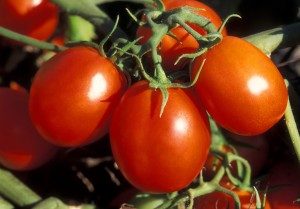
When Monsanto buys into a market they buy in big.
In 2005 Monsanto’s seed/genetic trait holdings were primarily in corn, cotton, soybean, and canola. That year they purchased Seminis, the world’s largest vegetable seed company (see And We Have the Seed) specializing in seed for vegetable field crops.
Now their takeover of the vegetable seed sector continues, as they have announced the intent to purchase the Dutch breeding and seed company, De Ruiter Seeds. This purchase diversifies Monsanto’s seed holdings in vegetable field crops (Seminis) to “protected culture” fruits and vegetables (primarily tomatoes and cucurbits produced greenhouse, hothouse, etc). Analysts from Bank of America say that this gives Monsanto 25% of the world vegetable seed market, but I believe that this is a low estimate. (I contacted both Monsanto and the BofA analysts to ask for their data but they did not respond to my emails.)
In 1998, according to their own figures, Seminis already controlled 26% of the overall global market in vegetable seeds, 39% of the US market, and 24% of the European market (Seminis. 2000. Seminis Annual Report—Fiscal Year 1999. Saticoy, CA: Seminis, Inc.). This is ALL vegetable seeds, but in their specialties – tomatoes, peppers, cucurbits, the percentage market share is much higher. A case filed by the US Government against Seminis in 2000 stated that they controlled 70% of the US fresh tomato seed market (the case was regarding an anticompetition agreement that kept a Israeli company from competing in the US tomato seed market. Syngenta initially lost in the federal district court case, but won in the Court of Appeals for the Ninth Circuit) And in 2005, at the time of the Monsanto acquisition of Seminis, I spoke with a tomato breeder for Seminis who estimated that they had 75% control of the overall US market.
With the De Ruiter protected-culture varieties they may hit 85% control of the total market, and that could increase considering the trend in expansion of hot house tomato production.
Hello, Department of Justice, do we have an antitrust case now?
I know it’s not corn, but fresh market tomatoes (FRESH, not including processing) was an industry worth over $4 billion (again, according to US Attorney General Documents). Tomatoes were the 9th most important agricultural food products in 2005 (and this against animal products) and the 4th (after corn, soybeans, and wheat) of food crops (non-animal).
De Ruiters is a Dutch company, so I believe the sale is outside of US DOJ jurisdiction. The Directorate General for Competition of the EU will likely not interfere, as Monsanto doesn’t own enough of the EU vegetable seed sector. There remains no cohesive international method for regulation on a global scale, which is wonderful for these global corporate firms.
One company with this much control in one of the largest agricultural markets in the US? Some economists use “The Rule of 3” – that a monopoly exists in a market if there are not a minimum of 3 competing companies . There are certainly more than two other tomato seed companies out there, but with what kind of market share? Do any of them have 10%? What about 5%? Scale is a requirement for competition. So who is competing with Monsanto on tomato seed? The rest of the market is a quilt work of tiny companies in comparison to what Monsanto has created in under three years with a handful of quick and unregulated acquisitions. Added to their seed concentrations in other crops, and given that food production starts with the seed, there should be no question of who controls our food supply. The only question is – will we do something about it?
I have to hope that the right administrative change will usher in the potential for a stronger Justice Department. At this point Obama has had the strongest voice in calling for greater government regulation of industry (primarily in reference to tightening up Wall Street). Regardless of who wins, we need to get farmers, food companies, and citizens working in concert to make congress, the executive branch, and Justice to hear our concerns about unregulated agricultural mergers.
